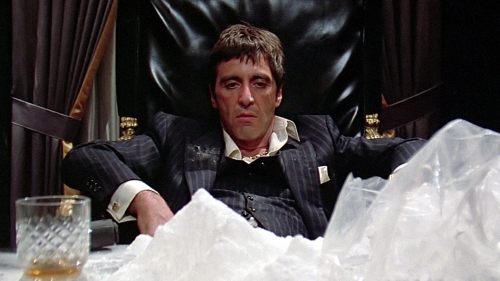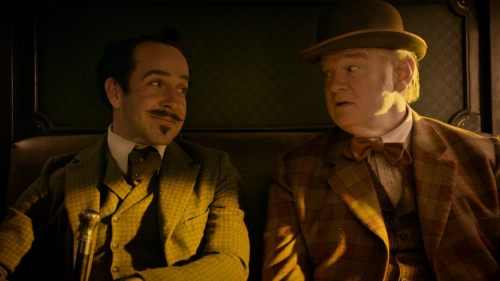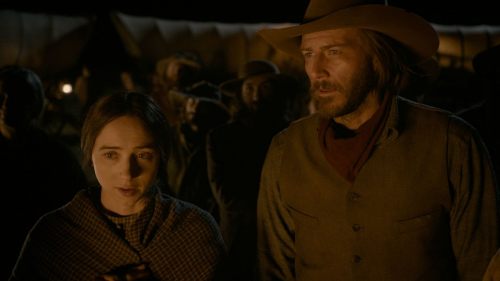Would An Imbecile Come Up With This: THE HUDSUCKER PROXY At 25
Aside from Inglourious Basterds, I think my favorite piece of alternate history presented on film is the invention of the hula hoop in The Hudsucker Proxy. A timeline where an ambitious dreamer meteorically rises to from the mailroom to the boardroom on his first day, puts into production a kids’ toy that became a cultural phenomenon, finds love, learns a few important life lessons, and saves the company at the expense of its board of directors is one that I definitely wish had happened. But in real life, the Coen brothers’ 1994 “Big Business comedy” is a sort of perfect time capsule and culmination of the kinds of ideas and stories that I was learning to enjoy in real life, which is why in addition to being this great screwball romance, it remains a sentimental favorite even among their eclectic and remarkable filmography.
The style of the film, inspired by the likes of Preston Sturges, George Stevens and Frank Capra, is one that few since that era have been able to successfully pull off - mostly because those filmmakers that try feel obligated to update or comment on it. The Coens, collaborating with Sam Raimi, were affectionately trying to make their own version of one of those films, featuring a decent, ordinary man, a fast-talking career gal, and a plot that would swallow both of them whole were it not for their purity and their love for one another. Setting their film in 1958, they populate the cast, sets and dialogue with endless immersive details that evoke the era - in some cases for real, but certainly in the cinematic memory of the viewer. The characterizations, pacing and storytelling all echo the filmmaking of their forebears, but in an exception rare for their frequently tongue-in-cheek films, the Coens aren’t winking or making fun but rather celebrating the energy and sentimentality of the genre tropes within which they’re working.
A fresh-scrubbed Tim Robbins is perfect as Norville Barnes, the goofy genius with enough ingenuity but not self-awareness to realize that the drawing of a circle stashed in his shoe is the world’s next Great Idea. And Jennifer Jason Leigh is radiant as Amy Archer, a whip-smart and cynical reporter capable of supplying her neighboring crossword puzzle maker with a nonstop series of clues and answers while reaming her editor on the phone, chatting up her fellow reporter Smitty (Bruce Campbell), and finishing an article on deadline. Paul Newman feels like kind of the only guy convincingly mean enough that the little metal balls of a Newton’s cradle immediately halt when he yells “stop,” and as Sidney J. Musberger, he perfectly captures the mentality of an executive so calculating and unscrupulous that he fails to recognize he’s hoisted himself with his own petard.
But what’s interesting 25 years later - at least if, like me, you were in 1994 on the precipice of making some adult breakthroughs as a cinephile - is how it brings together so many elements of movies that were being made at that time in a way that is so special and unique. Visual effects supervisor Michael J. McAlister had worked on Return of the Jedi, Indiana Jones and the Last Crusade, Willow and Die Hard 2; miniatures supervisor Mark Stetson helped create models for Ghostbusters, Total Recall, Dick Tracy and Batman Returns. Combined with Carter Burwell’s majestic, sweeping score, their work echoed all of those past credits as they created a towering, magical New York landscape where it would be easy to see Batman flying through, but for the purpose of telling a story about corporate malfeasance and tender romance. The real superhero, it turned out, was love.
There’s also dozens of supporting characters, scenes and little details that prove just as enchanting now as they did a quarter of a century ago, from Peter Gallagher’s ballroom crooner and Steve Buscemi’s beatnik bartender to Norville and Amy’s meet-cute in front of two dyspeptic cabbies to the entire “hula hoop” sequence, from concept to completion, which was brilliantly directed by Raimi himself. Unfortunately if somewhat predictably, it was a flop; producer Joel Silver gave the Coens $25 million and final cut and in return they gave him the brownest, most expensive screwball comedy ever made, and perhaps more surprising, the least snarky film of their career. That said, it also supplied skyscraper models for The Shadow, two Batman movies and Godzilla, continuing its legacy if only on a subliminal level, proving that history, even if overlooked, forgotten or in this case manufactured, lives on, and is always worth revisiting. But ultimately, The Hudsucker Proxy is as sweet, silly and affecting now as it was then; it’s a perfect tribute that doesn’t just celebrate a genre, but recreates it in meticulous detail, and best of all, makes you believe that wild ideas and pipe dreams can come true - especially if you put a little sand inside to make the experience more pleasant.



